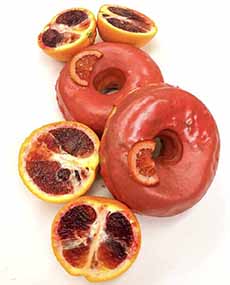FOOD FUN: Celebrate National Irish Coffee Day With Slane Whiskey & Dough Doughnuts
|
As a food writer, we get invited to special tastings: sometimes new products, sometimes new ways to use existing products, and sometimes, two brands get together to create something special and fun. Such was the case this week with Slane Irish Whiskey and Dough Doughnuts. The two brands got together to celebrate the upcoming National Irish Coffee Day, on January 25th. Members of the media were treated to an advance taste of what will be available on January 21st, and for for a week following National Irish Coffee Day. There are three limited-time flavors of Dough Doughnuts were inspired by Slane Irish Whiskey, and the whiskey is incorporated throughout the dough, frosting and filling: Are these delicious doughnuts worth going out of your way for? Yes! An old word for ball was nut; a doughnut is literally a nut (ball) of dough. The term “doughnut” was first used in print in 1809 by American author Washington Irving in his satirical “Knickerbocker’s History Of New York.” Irving wrote of: “…balls of sweetened dough, fried in hog’s fat, and called doughnuts, or olykoeks*.” These balls, or nuts of fried dough, are what we now call (in a smaller size) doughnut holes. Because the center of the cake did not cook as quickly as the outside, the softer centers were sometimes stuffed with fruit, nuts, or other fillings that did not require cooking (think of the chopped onions in the center of a bialy). What about the hole? Per Smithsonian, a New England ship captain’s mother made a notably delicious, deep-fried dougnhut that used her son’s spice cargo of nutmeg and cinnamon, along with lemon rind. She filled the center with hazelnuts or walnuts. As the story goes, in 1847, 16-year-old sailor Hanson Crockett Gregory created the hole in the center of the doughnut. He used the top of a round tin pepper container to punch the holes, so the dough would cook evenly. He recounted the story in an interview with the Boston Post at the turn of the century, 50 years later. He effectively eliminated the need to fill the less-cooked center, and provided an inner cut-out that enabled the dough to be evenly cooked. Who changed the spelling to donut? The first known printed record of the shortened word “donut” appears (likely an inadvertent misspelling) in “Peck’s Bad Boy And His Pa,” a story by George W. Peck published in 1900. |
|
|
|
The spelling did not immediately catch on. That impetus goes to Dunkin’ Donuts, founded in 1950. Donut is easier to write, but we prefer the old-fashioned elegance of doughnut. Take your choice. Doughnuts didn’t become a mainstream American food until after World War I. American doughboys at the front were served doughnuts by Salvation Army volunteers. When the doughboys returned, they brought their taste for doughnuts with them [source]. The name doughboy wasn’t related to the doughnuts, by the way. It dates to the Civil War, when the cavalry unchivalrously derided foot soldiers as doughboys. Two theories are offered: Dough Handmade & Artisanal Doughnuts is the supreme doughnut/donut experience menu is carefully curated to bring customers a selection of flavors and textures to satisfy different tastes and cravings. The doughnuts are made with a brioche-type dough prepared in small batches throughout the day. There are oh so many tempting flavors, not to mention seasonal specialties. Here’s more about Dough Doughnuts. Slane Irish Whiskey is a bold, new take on Ireland’s renowned spirit. It uses a tripled casked method for a spicy and woody taste to be enjoyed both neat and in cocktails. It was created by Brown-Forman working with the Conyngham family, which has three centuries of ties to the village of Slane in County Meath, on the River Boyne. Using a blend of virgin, seasoned and sherry casks, the resulting spirit is bold, yet smooth and more robust and complex than a traditional blended Irish whiskey. ________________ *Olykoek is Dutch for oil cake, i.e., batter fried in oil. While dough was/is fried the world over, we can thank the Dutch for the sweet balls fried in hog fat that became modern doughnuts.
|
||





